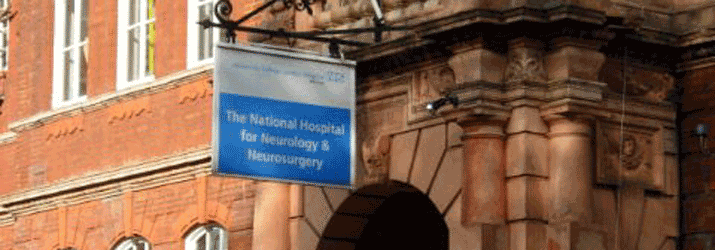
After a positive response when it was introduced last year, Neurology 2015 ran for a second year, aiming to present cutting-edge neurology for the modern clinician. The National Hospital for Neurology and Neurosurgery (NHNN) has historically played a major role in guiding practice in the field. With changes in modern medical practice and evidence-based medicine, this institution continues to be involved in guiding modern practice for the management of neurological disorders. This was exemplified by the high quality of talks provided by leaders in the field, who are currently working at the NHNN.
The course presented an ambitious programme of talks centred around six topics in the field, over two days. It kicked off with clinical sessions relating to leading treatments of acute neurological disorders: starting with a comprehensive talk on the clinical manifestations and treatment of Guillain-Barré Syndrome presented by Dr Howard. He discussed new potential treatments, based on recent understandings of the pathophysiology of the condition. This was followed by a talk on treatment of meningitis by Dr Farmer. He discussed the most common pathogens for the disease, options of antibiotic regimes as well as prospects of vaccination. Professor Shorvon discussed the challenging management of super-refractory status epilepticus with an invitation for all participants to register new cases online for the development of consensus criteria (please visit: www.status-epilepticus.net).
The first topic was followed by a scientific talk from Nobel Prize laureate Professor James Rothman. He presented key findings from his research, namely the discovery of ‘SNARE’ proteins which are involved in cellular membrane fusion, leading, among other functions, to exocytosis and therefore mediating neurotransmission. His work has implications for several neurological disorders including myasthenia and Lambert-Eaton myasthenic syndrome, in addition to explaining the effects of botulinum (and other) toxins on the nervous system.
Dr Gordon Plant brought the clinical discussion back on the table by presenting eye movement disorders in clinical case-vignettes.
The afternoon topics were centred on the clinical approaches to neuromuscular disorders with talks from Professor Reilly on the diagnosis and management of peripheral neuropathy, noting recent advances on the genetic classification of inherited forms of the disease. Professor Hanna presented a clinical approach to diagnosing muscle disorders. Professor Kullman ended the session with disorders of the neuromuscular junction, in particular myasthenia gravis.
The late afternoon sessions were on the management of clinical disorders: namely headache and Parkinson’s disease. Dr Matharu presented an evidence-based approach to migraine and chronic headache, with upcoming treatments proposed, including neuromodulation. Professor Bhatia ended the topic with a discussion on therapeutic approaches to the management of Parkinson’s Disease (PD).
The following day started with a topic discussing areas where decisions about therapy can be difficult in neurology. Talks included a discussion on the challenges of selecting among newly developed disease modifying treatments in Multiple Sclerosis, presented by Dr Chataway. He described risks and benefits of each of the treatments and provided an approach on escalation regimes. Dr Rees presented therapeutic approaches to the management of gliomas, with progress in the field including new classification methods introduced by molecular oncology, as well as therapeutic options including the possibility of considering immunotherapy. The final talk in that session was provided by Miss Grieve, Consultant Neurosurgeon, on the management of vascular malformations and aneurysms. She discussed trials comparing treatment options, and new techniques making some neurosurgical approaches a safer treatment option.
This topic was followed by a session on NHS Commissioning with discussions on provision of neurology services with the current political and socio-economic framework, ahead of the elections.
Dr Lunn then presented a Clinico-Pathological Case, in typical UK Neurology and National Hospital tradition, which was answered by Dr Rees.
The afternoon topics centred on Neuropsychiatry and Dementia. This started with a clinical talk by Professor Rossor on the clinical evaluation of patients with dementia, with some video examples. Professor Joyce discussed neuropsychiatric manifestations of PD and their management. Finally Professor Collinge gave an overview of Prion Disease with new advances in diagnostic techniques and the possibility of new therapeutic trials, referencing the impressive work of Professor Mallucci in that field.
The final topic of the course centred on recent advances in the treatment of stroke. Dr Werring presented treatment therapies for acute strokes. Professor Martin Brown discussed stroke prevention.
This course provides an opportunity to learn on various neurological topics from experts in the field. The main positives of the course include the idea of alternating scientific and clinical talks, whilst keeping focused on the latter, and trying to provide the most recent evidence for treatment and therapies. The booklet for the course was nicely put together – containing details of the speakers, most recommended journal article of the topic and historical pictures of the National Hospital. Some of the speakers provided their slides in pdf attachments, which was useful, in view of the sheer volume of material covered. The venue, at the Institute of Education, was appropriate for the size of the event, and close enough to Queen Square if anyone wanted to visit… So we look forward to next year’s event, in anticipation of the possibility of a scientific talk to be provided by yet another UCL Nobel Laureate, namely Professor John O’Keefe!
ACNR 2015;15(3):26. Online 30/07/2015